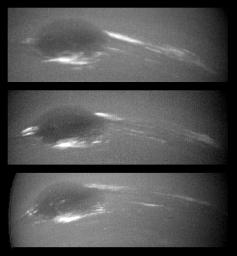
|
Neptune - Changes in Great Dark Spot
- Click the image above for a larger view
- Full-Res JPEG (430 x 465) (25.6 kB)
- Full-Res TIFF (430 x 465) (111.3 kB)
Caption:
The bright cirrus-like clouds of Neptune change rapidly, often forming and dissipating over periods of several to tens of hours. In this sequence spanning two rotations of Neptune (about 36 hours) Voyager 2 observed cloud evolution in the region around the Great Dark Spot (GDS) at an effective resolution of about 100 kilometers (62 miles) per pixel. The surprisingly rapid changes which occur over the 18 hours separating each panel shows that in this region Neptune's weather is perhaps as dynamic and variable as that of the Earth. However, the scale is immense by our standards the Earth and the GDS are of similar size and in Neptune's frigid atmosphere, where temperatures are as low as 55 degrees Kelvin (360 F), the cirrus clouds are composed of frozen methane rather than Earth's crystals of water ice.
Background Info:
The Voyager Mission is conducted by JPL for NASA's Office of Space Science and Applications.
Cataloging Keywords:
| Name | Value | Additional Values |
|---|---|---|
| Target | Neptune | |
| System | Neptune | |
| Target Type | Planet | |
| Mission | Voyager | |
| Instrument Host | Voyager 2 | |
| Host Type | Flyby Spacecraft | |
| Instrument | ||
| Detector | ||
| Extra Keywords | Atmosphere, Grayscale, Methane, Rotation, Storm, Water | |
| Acquisition Date | ||
| Release Date | 1996-01-29 | |
| Date in Caption | ||
| Image Credit | NASA/JPL | |
| Source | photojournal.jpl.nasa.gov/catalog/PIA00047 | |
| Identifier | PIA00047 | |
